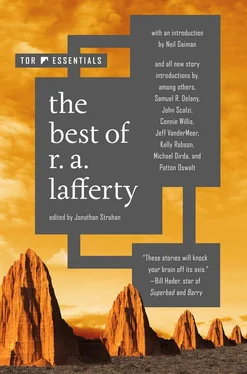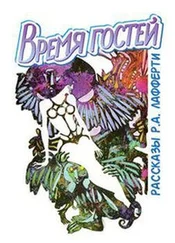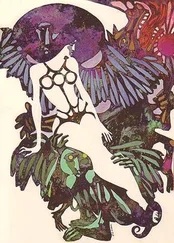There come certain bell men with music carts. They play rangle-dangle Sky music. They come for love of us. And if we can hurry fast enough when they come we can go with them, we can ride a tin can over the sky.
Bong! bong! that is the bell man with the music cart now! All the Shelni hurry! This is the day you may get to go. Come all you Shelni from the valley and the stream and jump on the cart for the free ride. Come all the Shelni from the meadows and the woods. Come up from the tree roots and the holes underground. The Skokie don’t get to go, the Frogs don’t get to go, only the Shelni get to go.
Cry if the cart is too full and you don’t get to go today, but don’t cry too long. The bell men say that they will come back tomorrow and every day till there are no Shelni left at all.
“Come all you little Singing-Pig-Shelni,” a bell man shouts. “Come get your free rides in the tin cans all the way to Earth! Hey, Ben, what other animal jumps onto the slaughter wagon when you only ring a bell? Come along little Shelni-Pigs, room for ten more on this wagon. That’s all, that’s all. We’ll have lots more wagons going tomorrow. We’ll take all of you, all of you! Hey, Ben, did you ever see little pigs cry when there’s no more room for them on the slaughter wagon?” These are the high kind words that a bell man speak for love of us.
Not even have to give a burial tooth or other tooth to pay for the ride. Frogs can’t go, Skokies can’t go, only the Shelni get to go!
Here are the wonderful things! From the wagon, the Shelni get to go to one room where all their bones are taken out. This does never happen to Shelni before. In another room the Shelni are boiled down to only half their size, little as little-boy Shelni. Then they all get to play the game and crawl into the tin cans. And then they get their free ride in the tin cans all the way to Earth. Ride a tin can!
Wipe off your sticky tears you who miss the music cart today. Go to sleep early tonight and rise early tomorrow. Sing your loudest tomorrow so the bell men will know where to come. Jug the flutes very strong tomorrow, tang the tines deep, say whoop! whoop! here we are, bell men.
All laugh when they go with the bell men in the music cart. But there is story that someday a Shelni woman will cry instead of laugh when they take her. What can be the matter with this woman that she will cry? She will cry out, “Damn you, it’s murder! They’re almost people! You can’t take them! They’re as much people as I am. Double damn you, you can’t take me ! I’m human. I know I look as funny as they do but I’m human. Oh, oh, oh!” This is the funniest thing of the story, the prophecy thing part.
Oh, oh, oh, the woman will say, Oh, oh, oh, the jug flutes will echo it. What will be the matter with the Shelni woman who cries instead of laughs?
This is our last story, wherever it is told. When it is told for the last time, then there will be no more stories here, there will be no more Shelni. Who needs stories and jug flute music who can ride a tin can?
That is how it has been said.
Then we went out (for the last time, as it happened) from the Shelni burrow. And, as always, there was the riming with the five-year-old Ancient who guarded the place:
“What to crowing?”
“Got to going.”
“Jinx on Jolly,
“Golly, Holly!”
“Were it other,
“Bug, my brother!”
“Holly crying.
“Sing her flying,
“Jugging, shouting.”
“Going outing.”
Now this was remarkable. Holly Harkel was crying when we came out of the burrow for the (as it happened) last time. She was crying great goblin tears. I almost expected them to be green.
Today I keep thinking how amazingly the late Holly Harkel had finally come to look like the Shelni. She was a Shelni. “It is all the same with me now,” she said this morning. “Would it be love if they should go and I should stay?” It is a sticky business. I tried to complain, but those people were still ringing that bell and chanting, “All you little Pig-Shelni-Singers come jump on the cart. Ride a tin can to Earth! Hey, Ben, look at them jump on the slaughter wagon!”
“It was inexcusable,” I said. “Surely you could tell a human from a Shelni.”
“Not that one,” said a bell ringer. “I tell you they all jumped on the wagon willingly, even the funny-looking one who was crying. Sure, you can have her bones, if you can tell which ones they are.”
I have Holly’s bones. That is all. There was never a creature like her. And now it is over with.
But it is not over!
Singing Pig Breakfast Food Company, beware! There will be vengeance!
It has been told.
NINE HUNDRED GRANDMOTHERS
Introduction by Patton Oswalt
And the oldest of the oldest grandmothers knows how the universe began. Or does she? And does she—or they—know how to live forever?
This is R. A. Lafferty dangling a simple, delicious carrot in front of his not-simple protagonist, a space plunderer named Ceran Swicegood. Of course, Ceran would like to think of himself as a “special aspects man,” a more refined breed than his compatriots who take brutish names like Manbreaker and Barrelhouse. These names, they feel, make it easier for them to pillage. A name like “Ceran Swicegood” is for someone who’s searching for more … esoteric and rarefied booty.
But it’s this rarefied, pretentious (and ultimately greedy) search that destroys poor Ceran quicker than the short-term, cash-money goals of his colleagues. Knowledge is power, but ultimate knowledge juuuuuuust out of reach is soul-poison.
Did I mention this story is also hilarious?
Nine Hundred Grandmothers
Ceran Swicegood was a promising young Special Aspects Man. But, like all Special Aspects, he had one irritating habit. He was forever asking the question: How Did it All Begin?
They all had tough names except Ceran. Manbreaker Crag, Heave Huckle, Blast Berg, George Blood, Move Manion (when Move says “Move,” you move), Trouble Trent. They were supposed to be tough, and they had taken tough names at the naming. Only Ceran kept his own—to the disgust of his commander, Manbreaker.
“Nobody can be a hero with a name like Ceran Swicegood!” Manbreaker would thunder. “Why don’t you take Storm Shannon? That’s good. Or Gutboy Barrelhouse or Slash Slagle or Nevel Knife? You barely glanced at the suggested list.”
“I’ll keep my own,” Ceran always said, and that is where he made his mistake. A new name will sometimes bring out a new personality. It had done so for George Blood. Though the hair on George’s chest was a graft job, yet that and his new name had turned him from a boy into a man. Had Ceran assumed the heroic name of Gutboy Barrelhouse he might have been capable of rousing endeavors and man-sized angers rather than his tittering indecisions and flouncy furies.
They were down on the big asteroid Proavitus—a sphere that almost tinkled with the potential profit that might be shaken out of it. And the tough men of the Expedition knew their business. They signed big contracts on the native velvet-like bark scrolls and on their own parallel tapes. They impressed, inveigled, and somewhat cowed the slight people of Proavitus. Here was a solid two-way market, enough to make them slaver. And there was a whole world of oddities that could lend themselves to the luxury trade.
“Everybody’s hit it big but you,” Manbreaker crackled in kindly thunder to Ceran after three days there. “But even Special Aspects is supposed to pay its way. Our charter compels us to carry one of your sort to give a cultural twist to the thing, but it needn’t be restricted to that. What we go out for every time, Ceran, is to cut a big fat hog in the rump—we make no secret of that. But if the hog’s tail can be shown to have a cultural twist to it, that will solve a requirement. And if that twist in the tail can turn us a profit, then we become mighty happy about the whole thing. Have you been able to find out anything about the living dolls, for instance? They might have both a cultural aspect and a market value.”
Читать дальше




![Рафаэль Лафферти - Дни, полные любви и смерти. Лучшее [сборник litres]](/books/385123/rafael-lafferti-dni-polnye-lyubvi-i-smerti-luchshe-thumb.webp)
![Рафаэль Лафферти - Лучшее [Сборник фантастических рассказов]](/books/401500/rafael-lafferti-luchshee-sbornik-fantasticheskih-ra-thumb.webp)